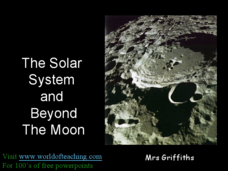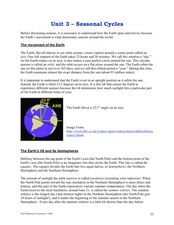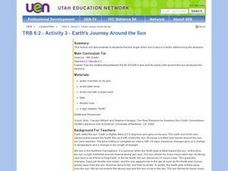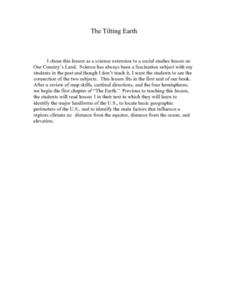Curated OER
Planet Earth
In this Earth worksheet, students review 13 terms associated with the Earth's rotation, revolution, and orbit. Students find the terms in a word search and then fill in the term next to its definition.
Curated OER
The Earth in Space
Students use computer images to explain why the Earth has seasons and examine the phases of the moon. They create 3-D images and present them to the class. They answer a series of questions at the end of the lesson.
NASA
The Science of the Sun
There's more to that glowing ball of light in sky than most children realize. From the overall structure of the solar system, to the changing of the seasons, these hands-on lessons open the eyes of young scientists to the important role...
Curated OER
Tides, Eclipses, Day and Night, and Seasons
In this earth science worksheet, learners use the clues given at the bottom of the sheet to complete the crossword puzzle on tides, eclipses, day and night, and the seasons of the year. There are 17 clues to solve in the puzzle.
Curated OER
Sundials and Shadows - What Can They Teach Us About Seasons?
Students collect and analyze data relating to seasonal changes. They view a video, research web sites and build a sundial to collect their data.
Curated OER
Tilted Earth
What causes Earth's seasons? Find out through a series of anticipatory questions, an easy yet powerful activity representing the sun-Earth system, a diagram to label, and follow-up questions. Dispel the misconceptions about Earth being...
Curated OER
The Four Seasons - Earth's Rotation
Students identify characteristics in correlation with each season and identify dates of the changing seasons. They identify and describe how the Earth rotates around the sun and its effects on the temperatures of the earth.
Curated OER
The Solar System and Beyond: The Moon
Here is a very basic look at the moon and its positioning around our planet. The pictures and labels here show different phases and will help your space explorers understand our changing views of the moon along with the Earth's tilt and...
Curated OER
Seasons on Earth
Students engage in a multimedia study of the seasons in relation to the sun's angle of incidence on the Earth as it is tilted on its axis. They interpret satellite maps of the world as they show seasonal changes in plant life.
Curated OER
Reasons for the Seasons
Middle schoolers discover how the Earth's axis of rotation affects the angle of sunlight and the length of day. They take a survey and give the survey out to family members and friends. They tally their findings and then determine the...
Space Awareness
Climate Zones
The climate at the equator is hotter than the climate at the poles, but why? The lesson goes in depth, explaining how the angles of illumination relate to the heating rate at different latitudes and seasons. Scholars use a strong lamp,...
Curated OER
Observation and Inference
Assess your young scientists' understanding of the difference between observation and inference with this 20-question multiple choice quiz. It reviews a variety of physics and astronomy concepts, such as solar eclipses and sunspots, the...
Curated OER
Modeling the Seasons
Students explore the seasons and their attributes. In this geography lesson plan, students create a 3-D model of the Earth that showcases the elliptical travel of the Earth that causes seasons.
Curated OER
Seasonal cycles
Students understand that the rotation of the Earth is responsible for the seasons. In this seasonal cycles lesson, students learn how the rotation of the Earth affects the seasons. Students answer questions about the rotation, the...
Curated OER
Seasons
Students investigate the reason for seasons on Earth during three activities. They construct a model of the Earth and Sun to identify patterns in the changes of the angle of light on the Earth's surface. Then they conduct a heat...
Curated OER
A New Slant On The Seasons
Students identify how the tilt and position of the Earth causes the seasons. After a discussion of the seasons and when they begin. Using themselves as the objects in the universe, they role play how the rotational movement of the...
Curated OER
Earth's Journey Around the Sun
Sixth graders examine how the angle of the sun's rays is a factor in determining the seasons. They watch a teacher demonstration of the concepts and write a paragraph demonstrating their understanding.
T. Smith Publishing
Earth
Young astronomers read an informational text passage and then answer questions based on what they read.
Curated OER
Seasons and Shadows: Investigate How Shadows Shift Throughout the Year
Pupils examine their shadows and why they are different in the summer and winter. In this seasons lesson students complete an activity to see how the earth's tilt on its axis changes the length of shadows.
Curated OER
The Earth is Tilted, What Does that Mean?
Students examine the tilt in the Earth's revolution around the sun. Using that information, they draw a picture and label the indirect and direct rays of the sun. In groups, they answer discussion questions and complete an assessment...
Curated OER
Earth's Tilt Creates Seasons
Students examine how the Earth's tilt creates the seasons. In this seasons lesson, students study a diagram that shows the rotation of the earth around the sun and how it tilts during the rotation. They answer 4 discussion questions and...
Curated OER
Two Reasons for the Four Seasons
Learners explore the reasons for the seasons. In this season lesson,students use flashlights to demonstrate the movement of the Earth and how it influences the seasons. Learners label pictures and discuss what would happen if the...
Curated OER
The Tilting Earth
Fourth graders use a styrofoam ball on a stick to represent earth and a light bulb in the center of the room to represent the sun. They walk around the light, holding their sticks at an angle to show the tilt of the earth's axis. They...
Curated OER
Properties of Earth: Word Search
In this word search instructional activity, students search for words related to the Earth, the sun and it's movements. Terms include seasons, features, and movements.

























